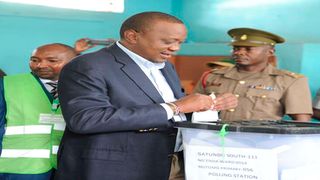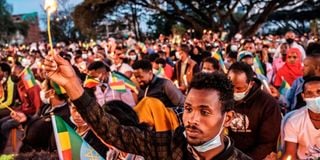
President Uhuru Kenyatta casts his vote in the presidential elections of October 26, 2017 at Mutomo Primary School in Kiambu County. President Kenyatta will complete his second and final term in August 2022.
|Africa
Premium
Key issues for Kenya, Africa in 2022
What you need to know:
- The 2022 Africa Cup of Nations in Cameroon will be the 33rd edition of the continent's biggest football bonanza.
- In Kenya, the IEBC will have the enormous responsibility of presiding over a peaceful, free and fair electoral exercise.
Africa in 2021 may have suffered the Covid-19 pandemic blows just as elsewhere. Despite having fewer recorded infections and deaths, the continent’s lagging in vaccination rates could now be the burden it carries into 2022. So what else will the continent face?
The good old Cup of Nations
When hosts Cameroon play Burkina Faso this Sunday evening in Yaoundé, it will mark the start of the 33rd edition of the Africa Cup of Nations. Africa’s biggest football bonanza, it has expanded over the years from just three teams to a biennial event of 24 teams.
And yet the kick off in Cameroon on Sunday, January 9, 2022, will be a slight respite both for the country battling its insurgency in Anglophone, as well as victory over those who doubted Covid-19 will curtail the start the tournament. There are new entrants in the tournament such as the Comoros. The Islanders, who were previously thought unable to play football, defeated Kenya on their way to their maiden appearance.

A vendor sorts out Cameroon national football jerseys on sale in Yaounde on January 5, 2022. The Africa Cup of Nations starts on January 9, 2022 in Cameroon after a postponement in 2021.
Kenya’s General Election
Although Kenya’s politicians are often in 24-hour campaign mode, 2022 is significant because it will see a new President take over from Uhuru Kenyatta who is completing his second and final term, as per the constitution. The outcome of the August 9, 2022 vote could mean new foreign policy directions or new regional realignments.
As a result, that could affect how Kenya relates with, say Somalia, with whom it has unfinished sea boundary row, or Ethiopia which has seen Nairobi frequently call for dialogue between the government and the Tigray People’s Liberation Front.
It will also be the final year of the two-year membership in the UN Security Council. Certain things like trade and security needs may remain constant, however, and whoever takes over may need to pursue cooperation.
Past elections have witnessed tension, or even violence, and so the Independent Electoral and Boundaries Commission has the enormous responsibility of presiding over a peaceful, free and fair electoral exercise.
Commonwealth meeting in Kigali
Delayed twice due to Covid-19, the Commonwealth Heads of Government Meeting (CHOGM) is due to take place in Kigali, Rwanda from June. The meeting is a routine Summit, but heads of government (of the UK and its former colonies, except Mozambique and Rwanda) will decide whether Patricia Scotland remains the Secretary General.
Kenya’s Devolution Cabinet Secretary Monica Juma was last year fronted for the race, probably shaking up a stable tree of African and Caribbean members that had backed Scotland in 2016.
Scotland will need backing from the UK, her home country, even though she is originally from the Caribbean. The meeting will also test her relations with Commonwealth’s biggest donors including Canada, New Zealand and Australia.

Rwanda's President Paul Kagame attends a bilateral meeting with his French counterpart at the Presidential Palace in Kigali on May 27, 2021.
Amisom future, counter-terrorism
One area that could still be a headache for President Kenyatta’s government this year is the future of Amisom, the African Union Mission in Somalia. A troop contributor, Kenya had joined others nations such as Ethiopia, Uganda, Djibouti and Burundi to seek a transformation into a hybrid mission funded by the UN, and which will include larger components of civilian technocrats to rebuild liberated areas, and institutions.
It is a position Somalia rejected. But thankfully, the African Union and Somalia will from Monday begin month-long discussions on the future of Amisom. Amisom may have helped stabilise Somalia in its 14 years, but an assessment by the International Crisis Group (ICG) says it did poorly in building civilian support for it. Yet, departing without a plan could ruin everything it achieved.

Kenya Defence Forces soldiers under Africa Union Mission in Somalia (Amisom) patrol Kismayo town in this picture taken on November 22, 2015.
“In Somalia, Al-Shabaab could seize power in Mogadishu much as the Taliban did in Kabul,” the Group said, referring to seizure of power by Taliban last year when US and allied forces left Afghanistan.
“Intervening foreign powers are caught as they were in Afghanistan: unable to achieve their goals but fearful of what will follow if they exit. For now, they appear set to stay,” ICG said in a bulletin earlier this week.
Amisom mandate expires on March 31, 2022, unless UNSC extends it or creates a replacement.
Whatever the UN Security Council decides by March, it argued, is to ensure a “greater civilian role alongside military campaigns.”
Ethiopia’s Tigray conflict
Prime Minister Abiy Ahmed batted way calls for dialogue for most of last year as he targeted the Tigray People’s Liberation Front, a group he considers a criminal clique. Yet, in spite of the drone attacks and subsequent liberation of crucial areas in Amhara and Afar regions, the war and its aftermath remains unfinished.

A man holds a candle during a memorial service for the victims of the Tigray conflict organized by the city administration, in Addis Ababa, Ethiopia, on November 3, 2021. China has expressed confidence in Ethiopian government handling the conflict.
This year will be significant because the UN Human Rights Council is due to appoint a team of three experts to investigate atrocities by both sides, something Ethiopia has said it will not allow, and the entire African members at the Council refused to vote for. That politics could frame how the region deals with the conflict now in its second year.
Sudan’s situation
Sudan’s transition was once promising, until the military took power by force in October. The soldier’s ‘victory’ has turned out pyrrhic as the transitional reform they promised fails to kick off. On Monday, Prime Minister Abdalla Hamdok resigned, following weeks of civilian protests against the military junta.
Hamdok only emerged from house arrest following the October 25 coup, after reaching a dealing to continue running the transition government with the military. The civilian components of the transitional government though have refused the military terms.
That coup was defended by the junta as necessary to clean up wrangles, but it also undercut a clear programme on power sharing: It came just two weeks before the leadership of the Transitional Sovereign Council was to change hands to a civilian.

Sudanese people protest against a military coup that overthrew the transition to civilian rule, on October 25, 2021 in the capital Khartoum's twin city of Omdurman.
The Transitional Council is supposed to be the overall institution that oversees transition elements including security reforms and was supposed to change hands every year until after the three-year period in which Sudan would be ready for elections.
In 2020, the change had been delayed so when the junta conducted a coup, civilian groups doubted the democratic credentials of the junta. In 2022, the military will have a burden of building trust with civilians, as well as strengthening ties with donors like the US who have warned they could cut funding unless civilians lead.





